Surani
Five essential tips for teaching very young children English. Are you daunted by the prospect of teaching English to very young children? Sheona Gilmour, lead educator on our new online course for teachers and parents, offers a few tips. Teaching English to very young children can be challenging, especially if you haven't done any training for the early years classroom.
The first time I walked into a kindergarten, I didn’t want to go back the next day. I came from a background of teaching older children, who sat at desks and whose attention I could hold more easily. So the new environment, full of young children with much shorter attention spans, felt overwhelming. But if you take on board a few essentials, there's a good chance you'll end up cherishing the experience. 1.
Assessment for learning. Observation, Assessment and Planning - Early Years Matters. Early Learning for Every Child Today. A framework for Ontario early childhood settings.
Let’s lose the ADHD label and find the child. When I trained as a primary school teacher 15 years ago, these were some of the words used to describe children with ADHD: ‘Difficult.’
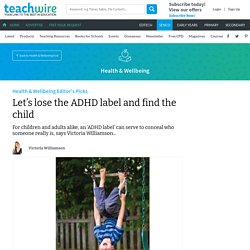
‘Challenging.’ ‘Disruptive.’ There were others, whispered by harassed-looking teachers in the staffroom or concerned parents at the school gates, but none seemed to be positive. When I got my first ‘real’ class to teach, and saw that some of the children came with the dreaded ‘ADHD’ label attached, I approached the new term with butterflies the size of dragons in my stomach.
Moodle. This ‘Kindness Curriculum’ Is Free And Should Be Used In Every Classroom. Imagine living in a world that valued kindness enough to teach it along with academics. Educators would teach kids to manage their emotions in addition to standard curriculum such as math and science.
Sounds pretty amazing, doesn’t it? Well, the Center for Healthy Minds at the University of Wisconsin-Madison has created a free “kindness curriculum” for kids, designed to do just that.
21 of the Best Early Years Books for International Friendship Day. We know that skills like empathy aren’t fully developed until later in a child’s life, which is why there are so many stories on friendship and how to treat people aimed at Early Years. International Friendship Day, then, is a great opportunity to share some of these amazing books with your children. It does, however, fall on Sunday 30 July. So celebrating on the day itself is going to be difficult, doubly so for Reception classes who are on summer holidays.
The Key to Effective Classroom Management.
It’s a daunting but all-too-common sight for many teachers: A classroom full of rowdy students who are unable to focus on the lesson. Classroom management techniques may get things back on track, but valuable time has already been lost. Many experienced teachers know that making meaningful connections with students is one of the most effective ways to prevent disruptions in the first place, and a new study set out to assess this approach. In classrooms where teachers used a series of techniques centered around establishing, maintaining, and restoring relationships, academic engagement increased by 33 percent and disruptive behavior decreased by 75 percent—making the time students spent in the classroom more worthwhile and productive.
“Strong teacher-student relationships have long been considered a foundational aspect of a positive school experience,” explains Clayton Cook, the lead author of the study and a professor at the University of Minnesota. Relationship reflection form. A 19-Year Study Reveals Kindergarten Students With These 2 Skills Are Twice as Likely to Obtain a College Degree (and They Have Nothing to Do With Reading)
One theory all teachers with disruptive children should know about. Imagine a classroom where children are unable to wait their turn or stay focused on their work.
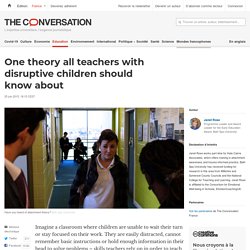
They are easily distracted, cannot remember basic instructions or hold enough information in their head to solve problems – skills teachers rely on in order to teach successfully. These behavioural issues are all examples of problems that can arise from attachment issues – based on the relationship between children and their main caregiver. Attachment theory is now one of the world’s most well-researched theories about human development. It was first proposed by the 20th-century British psychiatrist John Bowlby, who considered that children needed to develop a secure attachment with their main caregiver via sufficiently consistent, responsive, sensitive, appropriate and predictable care and support.
Don't Expect Toddlers To Behave Consistently — They Literally Can't. One day, when my oldest daughter was not quite 2, she wouldn’t sit still to let me change her diaper. Squirrelly and writhing, she made a game out of staying half naked. She wasn’t fussing about it or anything — in fact, she was giggling maniacally. The problem was that we were running late.
Can Free Play Prevent Depression and Anxiety In Kids?
KQED Public Media for Northern CA. Babies and toddlers raised in supportive and caring home environments tended to do better on standardized tests later on, and they were more likely to attain higher degrees as adults.
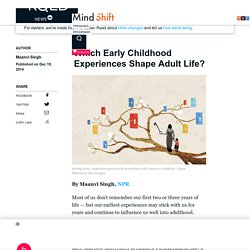
They were also more likely to get along with their peers and feel satisfied in their romantic relationships. "It seems like, at least in these early years, the parents' role is to communicate with the child and let them know, 'I'm here for you when you're upset, when you need me.
KQED Public Media for Northern CA. To make that argument requires a deep dive into the profound nature of empathy.
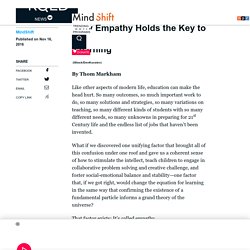
Right now, empathy roughly equates to “I like you and am willing to tolerate you regardless of differences because I am a good person.” But the textbook definition hints at something more profound: It’s ‘the feeling of being able to understand and share another person’s experiences and emotions.’ That all-encompassing definition means empathy results from a complex mix of other meaningful emotions and attitudes that fuel human personality, such as openness, curiosity, self-restraint, vulnerability, sensitivity, awareness, respect, appreciation, and even love.
Add this list to the fact that empathy can’t manifest unless we have had our own experiences and emotions to contrast, compare, and connect with others—and we can see that empathy is more than a simple connector; it’s the subterranean, fundamental glue that holds humanity together.
HowLearningHappens. Positive Learning Environment - Primary. Background_to_the_Concept_of_Schema. EducatorsEn. NQS_PLP_E-Newsletter_No36. Key Person & Attachment - Early Years Matters. The Key Person Children thrive from a base of loving and secure relationships.
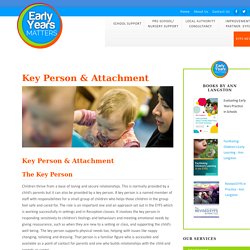
This is normally provided by a child’s parents but it can also be provided by a key person.
How Are Happiness and Learning Connected?
As teachers, we also know that when students' affective filters or defenses are sky high, fight or flight responses will be modus operandi. A room full of defensive behaviors (withdrawn, angry) is a sad, unproductive place to teach and learn. Now let's flip it and take a look at how much more we are able to learn when we are in harmony with the people and things in any given educational environment.
Being in harmony means feeling safe, feeling valued and a necessary part a group, and in this case, a learning community.
Quality Interactions Early Years. Total physical response - TPR. Where is it from?

How can I use it in class? When should I use it?
Being Multilingual: The natives and the speakers. Let me start with the good news.
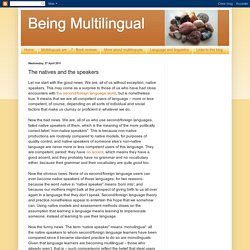
We are, all of us without exception, native speakers. This may come as a surprise to those of us who have had close encounters with the second/foreign language world, but is nonetheless true.
Being Multilingual: You speak with an accent. I don’t.
Accents are things that only other people have. They are, by extension, things that you don’t want to have. Accents are, in short, shortcomings. This is why, if someone tells you that “you speak with no accent”, you can be sure of two things: that you have received words of praise indeed; and that you speak with the same accent as that person.
So the person is actually not only praising her own accent, she is also giving evidence that she has no idea she’s got one.
Moodle. Making their mark children's early writing. Whole Child Development Is Undervalued. The question is how to make such an approach both systemic and sustainable. Whole Person Socio-emotional, physical, creative, and cognitive capacities are deeply intertwined and equally important in ensuring a child's wellbeing, learning, and growth.
Poems for kids. Nursery Rhymes and Songs - BBC Teach. Music and Movement Activities for Toddlers and Preschoolers. 50+ Quick & Easy Kids Crafts that ANYONE Can Make!
Songs for kids. Short stories for kids. How to teach children English using illustrated storybooks. What makes illustrated storybooks such a good resource for teaching young learners of English? The British Council’s Gail Ellis, co-author of a storytelling handbook for primary English language teachers, explains.
Children-under-5-walking. Children-under-5-years. Nihms175063. Ey_making_mark_matters76708_1_
How to help your child learn English with YouTube videos.
Tracey Chapelton, education consultant and materials writer, has some advice for parents of young English learners, whose home language might not be English.
Serve and Return. MIT Brain Study: Back-And-Forth Talk Key To Developing Kids' Verbal Skills. Effective Teacher-Child Interactions.
The Brain-Changing Power of Conversation. The Science Researchers used highly faithful audio recorders — a system called Language Environment Analysis (known as LENA) — to capture every word spoken or heard by 36 4–6 year olds from various socioeconomic backgrounds over two full days.
Quality Interactions Early Years. Moodle. Moodle. A longitudinal investigation of the role of quantity and quality of child-directed speech in vocabulary development. Carol Dweck: The power of believing that you can improve. How can parents and teachers best educate young children?
What principles can both teachers and parents bring to the education of very young children?
Gillian Craig, who was part of the Learning Time with Shaun and Timmy writing team, explains. As teachers and parents, we follow certain principles in our roles.
NQS_PLP_E-Newsletter_No43. Listening Skills for Staff. The Power (and Peril) of Praising Your Kids. Schemas in Children’s Play - N a t u r e P l a y. FAQ: Raising Bilingual Children. Taking Playtime Seriously. David whitebread importance of play report. Importance of play for babies & children.
ZERO TO THREE. 5 ways to win over parents to the importance of play in international EYFS. Getting the right balance between adult-led and child-initiated learning. 6 Types of Play: How Children's Play Becomes More Social. Heuristic Play: a simple guide. The Power of Evening Routines.







